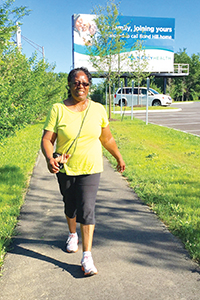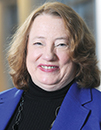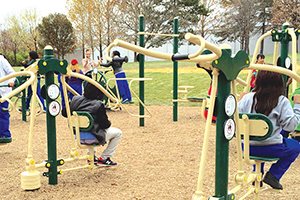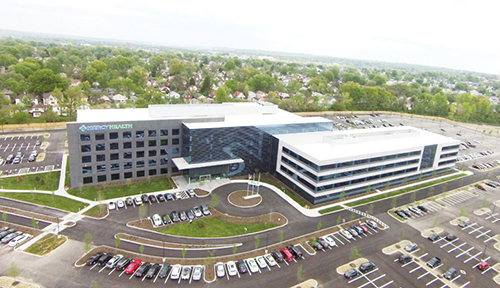By BETSY TAYLOR
A jobs training program. A free outdoor gym to encourage fitness. Health care practitioners providing convenient care where people live and work.

Area resident Peggy Simmons takes advantage of a walking trail outside of Mercy Health's new home office in the Bond Hill neighborhood of Cincinnati.
(Photos courtesy of Mercy Health)
Those are just some of the new offerings Mercy Health is supporting for its new neighbors in Bond Hill and Roselawn, two economically challenged Cincinnati neighborhoods. Mercy Health consolidated about 1,500 employees working downtown and in an inner ring suburb at its new headquarters in Bond Hill this year, having purposefully moved to a part of central Cincinnati overripe for redevelopment.
Its commitment to revitalization goes well beyond its $70 million economic investment in corporate offices. Ohio's largest health system partnered with community organizations to add resources in areas like health and wellness, education and job creation to benefit residents of Bond Hill and adjacent Roselawn, where the average household income is about $34,000 and $28,000, respectively.
To encourage wellness, Mercy Health has brought health care services to places where people live and work in Bond Hill and Roselawn, both quick-hit services — like screenings performed at health fairs and in mobile screening vans — and systematic changes, like the addition of a medical resident and supervising faculty doctor to offer more primary care appointments in Bond Hill's federally qualified health center.
Care close at hand
Last year, Mercy Health began sending a mobile mammography van to the Community Action Agency, a community nonprofit in Bond Hill. Joretta Kidd, a 60-year-old Roselawn resident, works nearby, and she was one of the first women to take advantage of the mammography service.
Her initial results from the July 2015 exam showed an area of concern, and she was diagnosed with Stage 0 breast cancer during a follow-up visit at a Mercy Health office. She underwent a lumpectomy and six weeks of radiation treatments. In August, Kidd had her one-year checkup following her diagnosis and treatment and she said she is doing well. "It's emotional for me, but I believe so much in it now, early detection," she said.
Modeling fit behavior
The system provided $75,000 in matching funds for the construction of the Greater Cincinnati Outdoor Gym, which opened last fall in the Roselawn neighborhood. The gym, part of a Cincinnati neighborhood enhancement program, is owned by the city. Mercy Health also contributed $25,000 in scholarships to pay for patients to enroll in a Type 2 diabetes prevention program. Participants in that program work out at the outdoor gym and at Yep! Fitness in nearby Roselawn.

Billups
Kurt Billups, founder and owner of Yep! Fitness, teaches in the diabetes prevention program, which uses a Centers for Disease Control and Prevention-approved curriculum. Doctors from a nearby Mercy Health practice refer patients to the diabetes prevention program, where people can take classes on healthy living and have their fitness progress tracked as part of their participation.
Billups also teaches free fitness classes at the outdoor gym. He said the outdoor gym has brought new life to the park, helping make it a more vibrant, active place. "Every public park, especially in the urban core, should look at ways to add value to those spaces," Billups said. Plus, people using the gym or taking an outdoor fitness class are modeling healthy behavior for others.
Billups said when he's teaching at the outdoor gym and sees neighborhood residents on the new walking track in the park, he encourages them to join one of the outdoor classes or try out the gym equipment.
Improving access to primary care
Starting this fall, an internal medicine resident and a faculty member from The Jewish Hospital — Mercy Health, located about 8 miles northeast of Bond Hill, will treat patients at WinMed Health Services, a federally qualified health center located in the Community Action Agency. Pat Davis-Hagens, Mercy Health's central market president and chief executive, said this is intended to relieve some of the staffing pressure at the clinic.

Davis-Hagens
One senior medical resident at a time will do a rotation at the clinic in a one to three month cycle, Davis-Hagens said. Mercy Health pharmacists are also planning to offer medication management sessions at the clinic, initially once a week, where they will review medications with patients, address patient questions and make sure patients understand dosing instructions.
Mercy Health is sponsoring other health-related events in Bond Hill and Roselawn as well, such as a farmer's market open from 3 p.m. to 6 p.m. on Fridays at the "great lawn" at the home office headquarters. It began in late June and will run into October with doctors on hand providing health information and Mercy Health nutritionists and therapists offering food and fitness demonstrations.
Transformative jobs
Mercy Health has an ongoing need for a diverse, well-trained workforce, and the system heard from community leaders and area residents about the need to create more jobs. To prepare that workforce, Mercy Health worked with Cincinnati State Technical and Community College, and the Community Action Agency to create a certified nursing assistant training program. It covers tuition and book costs for 32 people at a time. Presenters held information meetings about the program in the Bond Hill and Roselawn neighborhoods.

The Greater Cincinnati Outdoor Gym, partially funded by Mercy Health and open to the public for free, provides a place for residents of the Roselawn neighborhood to exercise on their own schedule or take part in an organized fitness class.
Cincinnati State offers the classes, which are taught at the Community Action Agency. Students attend 15 day or evening classes and take part in clinical training at a long-term care facility. Mercy Health intends to hire participants who pass the state's certification exam, to work in one of its five hospitals or one long-term care facility in Cincinnati.
None of these facilities are in Bond Hill or Roselawn, so new employees will commute. The Jewish Hospital is the closest Mercy Health hospital, and Mercy Health facilities in the city are accessible by public transportation.
Mercy Health interviewed about 200 people interested in taking part in the classes and a job within the system, said Julia Abell, Mercy Health system director of talent acquisition. The vast majority of the applicants were African-Americans, many of whom live in the Bond Hill and Roselawn neighborhoods.
Abell said the newly minted nursing assistants will increase Mercy Health's available pool of skilled workers and help diversify its staff. Mercy Health plans to offer the program four times a year, and to provide tuition support for staff hired through the program to continue on with their education and become medical assistants or nurses.

Mercy Health opened its new headquarters in Bond Hill earlier this year. Its commitment to address social determinants of health in economically marginalized surrounding neighborhoods includes new health, wellness and education offerings in Bond Hill and Roselawn.
Abell, who has been working for Mercy Health for five months, said helping to launch the new employment effort has been gratifying, especially when participants in the nursing assistant classes tell her how much the training and potential jobs means for them and their families. Within a few weeks on the job she realized the health care system truly lives its mission. "It was like an 'aha moment' for me," she said. "I had joined an organization that walked their talk."
Copyright © 2016 by the Catholic Health Association
of the United States
For reprint permission, contact Betty Crosby or call (314) 253-3477.